Search results for "2010/02/2009/09/what-god-said"
Utopia or cacotopia?
19 August 2011 | Extracts, Non-fiction
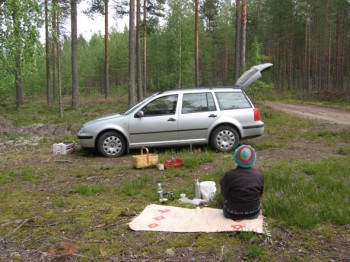
Viljakansaari, Finland, 2008. ©Merja Salo
Do we live in the age of autopia, and if we do, what does that mean? On this earth there are now perhaps 800 million cars, all vital to our modern lifestyles. Professor and photographer Merja Salo observes landscapes through her camera with this question in mind
Extracts and photographs from Carscapes. Automaisemia (Edition Patrick Frey & Musta Taide, 2011. Translation: Laura Mänki)
The car may be the vehicle for the everyman, but not every man is a good driver. According to Hungarian- born psychoanalyst Michael Balint, good drivers have the psychological structure of philobats. With their sense of sight, they perceive space well and control it by steering their vehicle skilfully. Ocnophiles, on the other hand, are more at home as passengers. They structure the world through intimacy and touch. When driving, they cling anxiously to the steering wheel and do not perceive the continously changing situations in traffic.
Ulla Jokisalo & Anna Kortelainen
Pins and needles
11 May 2011 | Essays, Non-fiction
In these pictures by Ulla Jokisalo and texts by Anna Kortelainen, truths and mysteries concerning play are entwined with pictures painted with threads and needles. Jokisalo’s exhibition, ‘Leikin varjo / Guises of play’, runs at the Museum of Photography, Helsinki, from 17 August to 25 September.
Words and images from the book Leikin varjo / Guises of play (Aboa Vetus & Ars Nova and Musta Taide, 2011)
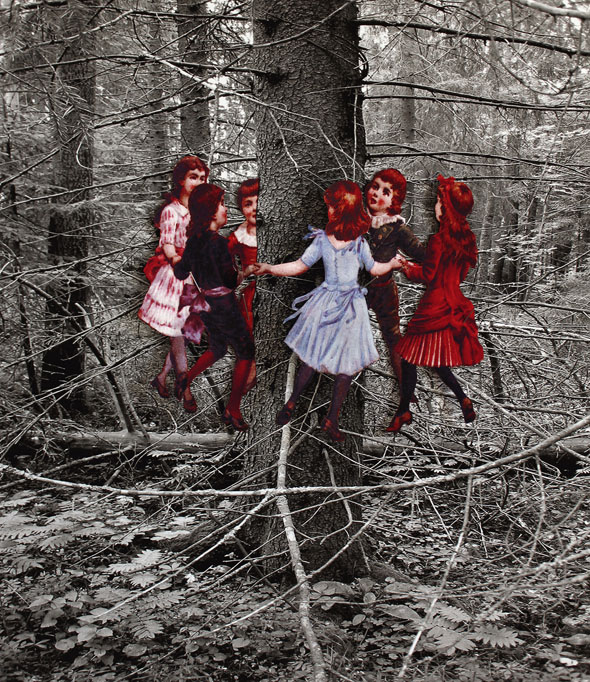
‘Ring dance’ by Ulla Jokisalo (pigment print and pins, 2009)
Pekka the brave
31 December 1983 | Archives online, Children's books, Fiction
An extract from Pekka Peloton (‘Pekka the brave’, 1982). Introduction by Leena Kirstinä
The other ghost was now very close to the Bear. The inhabitants of the Green Woods had pulled back out of its way in terror but the poor Bear couldn’t even get himself to budge. Miserable, he had covered his eyes and slumped down in his own fur.
‘Psst,’ the ghost whispered. ‘Hi, Bear, it’s only me.’ And the ghost poked the Bear in the ribs. ‘It’s me, Pekka. Come on, open your eyes!
But the Bear didn’t make a move to do what Pekka had asked and Pekka began to get worried. He knew the Wolf wouldn’t stay put for a very long time and little by little would start to wonder what this was all about. ‘Dear Bear,’ Pekka said in a louder voice, and punched him as hard as he could. ‘Get up! We haven’t much time … ‘ Pekka’s voice was trembling. ‘Look! I’ve got the key to your courage right here … ‘ More…
Close encounters
31 March 1999 | Fiction, Prose
Viimeinen syli (‘The last embrace’, Otava, 1998)
The hospital looked as if a child had been given a big pile of building blocks and told to make a house, a big house. And then, when the building was ready, more bricks had been brought, and the child had been forced to pile them up over a wider and wider area, to spread rows of blocks across the adults’ routes and over the edge of the carpet until at last it had grown bored and left the last blocks higgledy-piggledy next to its creation.
Around the hospital ran a road from which the whole mess was revealed. Wing after wing, corridors and windows from which no one really ever looked out. The hospital was full of window views that did not belong to anyone, which did not open up from anyone’s office or day-room, but varied meaninglessly like a motorway landscape from the window of an accelerating car. Viivi had been born there, on the sixth floor of the old part of the hospital. As Mikael waited in the tiled fathers’ room next to the room where the Caeserean section was being carried out for his child to be brought to him, the view out had been breathtaking. More…
Solitude growing
30 June 1995 | Archives online, Fiction, Prose
Extract from Häiriö maisemassa (‘A disturbance in the landscape’, Otava, 1994). In this, her first novel, Raija Siekkinen – well-known for the fragile prose fof her short stories – continues her dissection of the soul with an account of the experience of a womanwho finds that many lives are being lived through her own
She was pregnant. After all these years, the woman finally found she was pregnant: it was as if the man had made a last attack to retain his hold on a country he had once conquered.
She let the days go by, the days of autumn, which night by night edged more shadow across the damp lawn. She looked at the man from a distance, not seeing him; her mind rehearsed what she knew about him. The man had two children from a previous marriage. The woman had not wanted the children to come here, and neither did their mother; that was, indeed, the only subject on which they agreed. The man went to visit his children; they never spoke about what happened on those occasions. More…
The Confirmation Present
30 June 1980 | Archives online, Fiction, Prose
An excerpt from Rakas rouva K (‘Dear Mrs K.’, 1979). Introduction and interview by Auli Viikari
Lahtinen read through what he had written so far, and it pleased him, especially the quotation from Clausewitz. “It could be said,” he went on, “that the victories of the French Revolution during those two decades were due in most cases to the mistaken policies of its opponents, even though the actual coup that shook the world took place within the framework of war.” His article was about the British attitude to Germany’s expansionist policies. There would not be another Munich, he felt sure: the House of Commons had cheered Chamberlain for the last time. Where, he asked himself, would England eventually abandon the role of passive onlooker? At Danzig, surely. It would not be like Poland to give something for nothing. She would set a world war in motion, of that he had no doubt. And he could see Poland dissolving into ruin before his very eyes. More…
Tiger in the grass
31 March 2001 | Fiction, Prose
Extracts from the novel Maan ääreen (‘To the end of the earth’, Otava, 1999)
I left Kronstadt at the end of October in the year 1868, when I was 22 years old.
The Mozart was a three-hundred-ton barque. Even on the journey to Tvedestrand in Norway I vomited yellow bile and my toes and fingers froze. We lingered in Tvedestrand for three months while the vessel was repaired in dock. To amuse myself, I drew and wrote an accurate description of the ship. That work ended up in the sea. From the harbour captain’s library I borrowed German books which dealt with geology and topology. Their reality was different from that of the law and the interpretation of its letter and spirit. When a topologist draws a map, it has to be true. Otherwise travellers will get lost, I thought childishly, as if it were possible to draw a line between true and true. More…
Delina
30 September 1999 | Archives online, Fiction, Prose
A short story from Löytöretkeilijä ja muita eksyneitä (‘The explorer and other lost people’, Tammi, 1999). Introduction by Soila Lehtonen
The stranger met Delina at a development organisation’s work camp, but Delina was not a volunteer. Delina lived in the country permanently.
The stranger did not spend very much time in Delina’s company. His evenings were spent with fellow-volunteers in the village cafe, where Delina’s parents did not allow her to go. During the day, both of them worked in their separate ways: Delina at home and the stranger in the work camp’s fields.
The stranger did, however, get to know the girl well enough to hear that she was in love with a soldier called Zmiri from the nearest garrison. This soldier was arrested once when he and his comrades drunkenly molested volunteers – but Delina knew nothing of the case. More…
Choosing a play
30 September 1981 | Archives online, Fiction, Prose
A short story from Leiri (‘The camp’). Introduction by Vesa Karonen
The local amateurs were having their theatre club meeting on a Friday evening in the main part of the parish hall. It was late August, the light was beginning to fade and no one had remembered to put the lights on. First the stage grew dark, then the floor, then the ceiling. The light lingered on the inside wall for the longest. There were creaks and groans from the rooms at the back and from the attic. The caretaker had been moving around in there about three in the afternoon, and his traces lingered, as they do in old buildings.
“Something of that sort but short, and it’s got to be bloody funny,” said the chairman, a carpenter called Ranta.
In the store cupboard there were 108 old scripts. Tammilehto, the secretary, hauled out about 30 scripts onto the table. His job was running a kiosk down the road.
“Nothing out of date,” said Ranta.
“There’s got to be a bit of love in it, I say,” said Mrs Ranta.
She had a taxi-driver’s cap on her head and was wearing a man’s grey summer jacket, a white shirt and a blue tie. Her car could be seen from the window. It was in the yard. She always parked her car so it could be seen from inside. More…
When I’m ninety-four
14 November 2013 | Fiction, Prose
An extract from the novel Kuolema Ehtoolehdossa (‘Death in Twilight Grove’, Teos, 2013). Minna Lindgren interviewed by Anna-Leena Ekroos
At the Health Clinic, Siiri Kettunen once more found a new ‘personal physician’ waiting for her. The doctor was so young that Siiri had to ask whether a little girl like her could be a real doctor at all, but that was a mistake. By the time she remembered that there had been a series of articles in the paper about fake doctors, the girl doctor had already taken offence.
‘Shall we get down to business?’ the unknown personal physician said, after a brief lecture. She told Siiri to take off her blouse, then listened to her lungs with an ice-cold stethoscope that almost stopped her heart, and wrote a referral to Meilahti hospital for urgent tests. Apparently the stethoscope was the gizmo that gave the doctor the same kind of certainty that the blood pressure cuff had given the nurse.
‘I can order an ambulance,’ the doctor said, but that was a bit much, in Siiri’s opinion, so she thanked her politely for listening to her lungs and promised to catch the very next tram to the heart exam. More…
Season’s greetings
31 December 2002 | Archives online, Fiction, Prose
An extract from the novel Kolmastoista tuoli (‘The thirteenth chair’, Atena, 2002)
The start of the Christmas season was difficult for everybody, but it was one big upset for Ron and Dan, the twins. At Christmas, apparently, their whole world, all their schoolmates and backyard-mates, the whole gang of them, were avoiding the twins. No one seemed to be even talking to the twins, who said everyone was just concentrating on ‘being nice’.
‘Nice!’
The pain on the boys’ faces looked the real thing. They were without chums, and the reason was even more annoying.
‘They have to be nice, for they’re expecting presents from Father Christmas.’
Christmas was coming and was having a weird effect on the youngest. For the twins, effort and a reward for a good try were completely foreign concepts. At this point, their lives were sheer adventure. They were lavished with overflowing care and love – and not one Christmas present. More…
The unmaking of Finland’s forests
17 March 2010 | Reviews
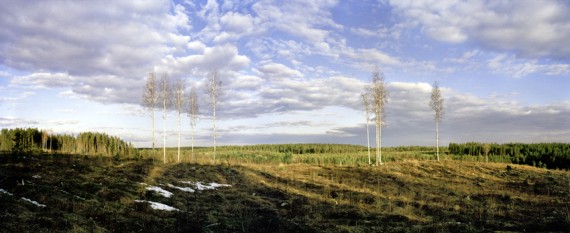
Natural landscapes? According to Metsähallitus, the government body charged with forestry, ‘the regeneration area is defined according to topography, in accordance with the landscape. Retention trees and groups of trees are always left standing in regeneration areas to enhance the landscape and to improve the survival chances of species that require old and decaying trees.’
Ritva Kovalainen & Sanni Seppo
Metsänhoidollisia toimenpiteitä
[Silvicultural operations]
Helsinki: Hiilinielu tuotanto ja Miellotar, 2009. 200 p., ill.
ISBN 978-952-99113-4-9
€ 43
Finns have a strong identity as forest people, partly because more than 95 per cent of them still speak an ancient hunter-gatherer language, Finnish, as their mother tongue. In spite of this cultural and historical background, Finland has become the world’s most eager and influential proponent of forestry models based on clear-cutting – felling all the trees in a particular area at one go and planting new trees to replace them. More…
Finnish best-sellers in Estonia
8 February 2010 | In the news
In mid-January four books out of ten on the best-sellers’ list in Estonia were translations of Finnish books: a history of Estonia by Seppo Zetterberg (Viron historia, 2007, number 1), a book on 20th-century Estonian history edited by Sofi Oksanen and Imbi Paju (Kaiken takana oli pelko, ‘Fear behind it all’, 2009, number 6), the 2008 Finlandia Prize-winning novel, set in 20th-century Estonia, by Sofi Oksanen (Puhdistus, ‘Purge’, number 7) and a new translation of the classic 1940s novel Sinuhe, egyptiläinen (English translation, Sinuhe the Egyptian) by Mika Waltari (number 10).
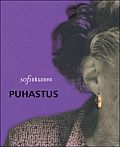 Oksanen’s novel was the second on the list of best-sellers in 2009. The list is run by Apollo bookstore chain; the largest in Estonia, it has ten shops in four cities and an internet shop. Apollo is owned by the Finnish Sanoma Trade, one of the five divisions of Sanoma Group, an European media corporation with activities in 20 countries and net sales of 3,030.1 million €.
Oksanen’s novel was the second on the list of best-sellers in 2009. The list is run by Apollo bookstore chain; the largest in Estonia, it has ten shops in four cities and an internet shop. Apollo is owned by the Finnish Sanoma Trade, one of the five divisions of Sanoma Group, an European media corporation with activities in 20 countries and net sales of 3,030.1 million €.
Yikes! How good are Finnish schools now?
28 November 2013 | This 'n' that
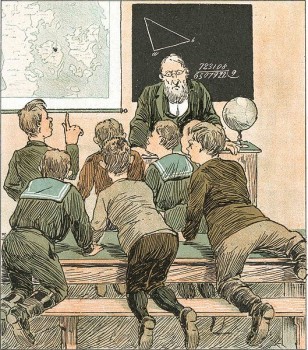
Questions and answers. Illustration, from a Danish magazine, 1890: Wikimedia
The new PISA results were published in December: these tests, conducted by the Organisation for Economic Co-operation and Development (OECD), measure the level of education of 15-year-old schoolchildren every three years.
Finland has done pretty well in recent years, so there has been interest in other countries in finding out what it is that makes Finnish schools better places for learning.
In 2000 Finnish pupils had been best at reading, and second at maths in 2003 – although competition has grown due to a larger number of countries, particularly in Asia – taking part in the study: for example, only 32 in 2000, but 65 in 2009 and in 2012.
In 2009 Finnish kids were third best in reading and sixth in maths. Now PISA 2012 results place Finnish kids in 12th place in maths, which created a stir in various educational circles. The best five were all Asian countries.
On the index list measuring skills at maths, science and literacy together, Shanghai leads, then come Singapore and Hong Kong. Finland is the best European country, number 7; Estonia is 8, Germany 16, Great Britain 21, the US 29, Sweden 38.
Non scholae, sed vitae discimus. Competition permeates everything now more than ever, but we do not learn for school but for life – not for PISA either. Still, teaching methods and students’ motivation are clearly worth improving.
The chances of learning on this globe are greater and more accessible than ever, but learning still takes brains, motivation and time. Yikes!
Comics turns
16 April 2010 | In the news
Comics make frequent appearances on the lists of best-selling Finnish books: on the ‘What Finland reads’ list in March, Pertti Jarla’s new comic strip book, Fingerpori 3, about the eponymous, weird city of Fingerpori (‘Fingerborg’), is number one. His two other Fingerpori books are number eight and ten on the list. The zany comedy in them is verbal, based on puns – and therefore not easily exportable.
The new and final volume of Hannu Väisänen’s autobiographical, fictional trilogy about the young wannabe artist Antero, Kuperat ja koverat (‘Convex and concave’) made its way into the top ten right away, making its appearance at number two.
The Finlandia Prize -winning novel, Gå inte ensam ut i natten (‘Don’t go out into the night alone’, translated into Finnish as Älä käy yöhön yksin) by Kjell Westö, is number three – the novel was published in September 2009, and this reappearance is partly explained by special campaigns in the bookstores, says Westö’s publisher, Otava.
Sofi Oksanen’s prize-winning novel Puhdistus (Purge, now published in English) from 2008, is back on the list again, now at number four. Kari Hotakainen’s latest novel, Ihmisen osa (‘Human lot’, 2009, to appear in English in 2012) is at number six.
